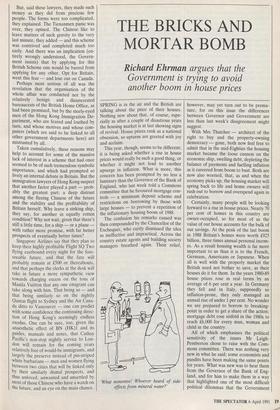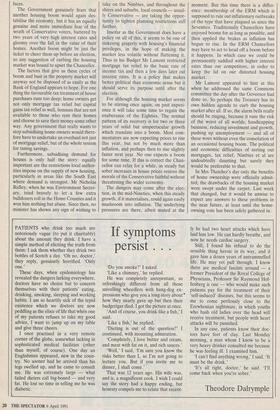THE BRICKS AND MORTAR BOMB
Richard Ehrman argues that the Government is trying to avoid another boom in house prices SPRING is in the air and the British are talking about the price of their houses. Nothing new about that, of course, espe- cially as after a couple of disastrous years the housing market is at last showing signs of revival. House prices rank as a national obsession, so upturns are greeted with joy and acclaim.
This year, though, seems to be different; it is being asked whether a rise in house prices would really be such a good thing, or whether it might not lead to another upsurge in inflation. What is more, this concern has been prompted by no less a luminary than the Governor of the Bank of England, who last week told a Commons committee that he favoured mortgage con- trols — a minimum deposit scheme and restrictions on borrowing by those with large houses — to prevent a repetition of the inflationary housing boom of 1988.
The confusion his remarks caused was then compounded by the Chancellor of the Exchequer, who curtly dismissed the idea as ineffective and impractical. Across the country estate agents and building society managers breathed again. Their relief, 'What nonsense! Whoever heard of side- effects from mineral water?' however, may yet turn out to be prema- ture, for on this issue the differences between Governor and Government are less than last week's disagreement might suggest.
With Mrs Thatcher — architect of the right to buy and the property-owning democracy — gone, both now feel free to admit that in the mid-Eighties the housing market became the loose cannon on the economic ship, swelling debt, depleting the balance of payments and fuelling inflation as it careered from boom to bust. Both are now also worried, that, as and when the economy picks up, the housing market will spring back to life and home owners will rush out to borrow and overspend again in celebration.
Certainly, many people will be looking forward to a rise in house prices. Nearly 70 per cent of homes in this country are owner-occupied, so for most of us the value of our house accounts for the bulk of our savings. At the peak of the last boom in 1988 Britain's homes were worth £925 billion, three times annual personal incom- es. As a result housing wealth is far more important to us than it is to the French, Germans, Americans or Japanese. When all is well with the property market the British need not bother to save, as their houses do it for them. In the years 1980-89 house prices rose in real terms by an average of 6 per cent a year. In Germany they fell and in Italy, supposedly so inflation-prone, they only managed an annual rise of under 1 per cent. No wonder we are prepared to borrow to breaking- point in order to get a share of the action; mortgage debt rose sixfold in the 1980s to reach £6,000 for every man, woman and child in the country.
All of which emphasises the political sensitivity of the issues Mr Leigh- Pemberton chose to raise with the Com- mons committee. There was nothing very new in what he said; some economists and pundits have been making the same points for years. What was new was to hear them from the Governor of the Bank of Eng- land, and for him to make them in a way that highlighted one of the most difficult political dilemmas that the Government faces.
The Government genuinely fears that another housing boom would again des- tabilise the economy, but it has an equally genuine and more immediate fear of the wrath of Conservative voters, battered by two years of very high interest rates and gloomy over the fall in the value of their homes. Another boom might be just the ticket to cheer them up before an election, so any suggestion of curbing the housing market was bound to upset the Chancellor.
The factors that give us these cycles of boom and bust in the property market will anyway not be disposed of as easily as the Bank of England appears to hope. For one thing the favourable tax treatment of house purchases runs too deep; home owners get not only mortgage tax relief but capital gains tax relief as well, bonuses that are not available to those who rent their homes and choose to save their money some other way. Any government that really wants to stop subsidising home owners would there- fore have to undertake an overhaul not just of mortgage relief, but of the whole system for taxing savings.
Furthermore, subsidising demand for houses is only half the story: equally important are the restrictions local author- ities impose on the supply of new housing, particularly in areas like the South East where demand is strongest. Mr Nicholas Ridley, when he was Environment Secret- ary, tried bravely to let a few extra bulldozers roll in the Home Counties and it won him nothing but abuse. Since then, no minister has shown any sign of wishing to take on the Nimbies, and throughout the shires and suburbs, local councils — usual- ly Conservative — are taking the oppor- tunity to tighten planning restrictions still further.
Insofar as the Government does have a policy on all of this, it seems to be one of tinkering gingerly with housing's financial privileges, in the hope of making the market less volatile without flattening it. Thus in his Budget Mr Lamont restricted mortgage tax relief to the basic rate of income tax and then a few days later cut interest rates. It is a policy that makes better political than economic sense but it should serve its purpose until after the election.
For although the housing market seems to be stirring once again, on past experi- ence it will take some time to regain the exuberance of the Eighties. The normal pattern of its recovery is for two or three years of solid but unspectacular growth which translate into a boom. Most com- mentators are now expecting prices to rise this year, but not by much more than inflation, and perhaps then to rise slightly faster next year. No one expects a boom for some time. If this is correct the Chan- cellor can relax for a while, as steady but sober increases in house prices restore the morale of the Conservative faithful without threatening the wider economy.
The dangers may come after the elec- tion, in the mid-Nineties, when this steady growth, if it materialises, could again easily mushroom into inflation. The underlying pressures are there, albeit muted at the moment. But this time there is a differ- ence: membership of the ERM which is supposed to rule out inflationary outbreaks of the type that have plagued us since the Seventies. Traditionally Chancellors have enjoyed booms for as long as possible, and then applied the brakes as inflation has begun to rise. In the ERM Chancellors may have to act to head off a boom before it happens. In which case we could be permanently saddled with higher interest rates than our competitors, in order to keep the lid on our distorted housing market.
Mr Lamont appeared to hint at this when he addressed the same Commons committee the day after the Governor had done so. So perhaps the Treasury has its own hidden agenda to curb the housing market after all. If so, the alarm bells really should be ringing, because it runs the risk of the worst of all worlds; handicapping business, reducing investment and growth, pushing up unemployment — and all of these woes without even the consolation of an occasional housing boom. The political and economic difficulties of sorting out mortgages, tax relief, Nimbies et al are undoubtedly daunting but surely they would be preferable to that.
In Mrs Thatcher's day only the benefits of home ownership were officially admit- ted; the drawbacks of the housing market were swept under the carpet. Last week that changed, but it would be unwise to expect any answers to these problems in the near future, at least until the home- owning vote has been safely gathered in.



















































 Previous page
Previous page